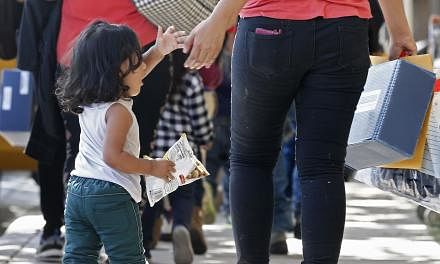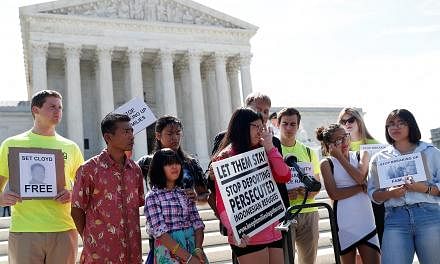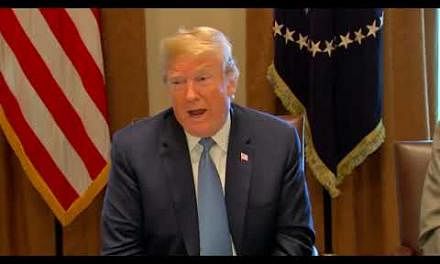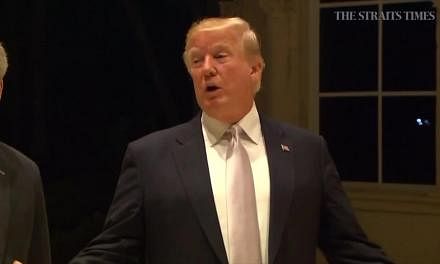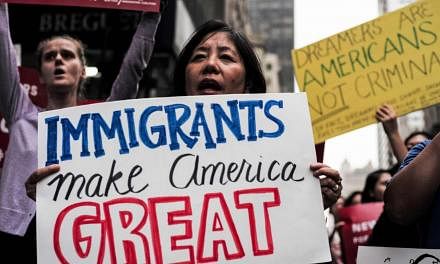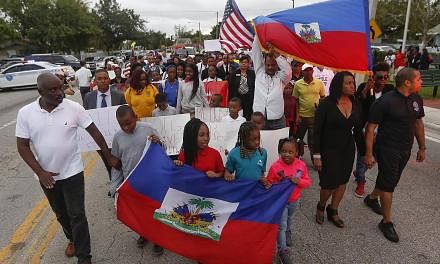WASHINGTON (REUTERS) - Backlash built on Monday (Jan 30) against US President Donald Trump's travel and immigration restrictions targeting seven Muslim-majority nations as opponents tried to throw up roadblocks, including more court challenges.
The state of Washington announced it would sue, saying Republican Trump's executive order violated the US Constitution, and Democrats in Congress pushed a vote to try to rescind the bill, but were blocked.
Mr Trump's directive on Friday put a 120-day hold on allowing refugees into the country, an indefinite ban on refugees from Syria and a 90-day bar on citizens from Iran, Iraq, Libya, Somalia, Sudan, Syria and Yemen.
The president argues that his action will protect America from terror attacks but critics complain that it unfairly singles out Muslims and defiles America's historic reputation as a welcoming place for immigrants.
An internal Department of Homeland Security (DHS) document seen by Reuters showed 348 visa holders were kept from boarding US-bound flights this week, and more than 200 people came to the United States but were denied entry.
More than 735 people were pulled aside for questioning by US Customs and Border Protection officers in airports, including 394 green card holders, who are legal permanent residents of the United States, the document said.
Mr Trump's order was developed hastily and was not extensively reviewed by the agencies which are now grappling with implementing it. His administration is granting waivers from the refugee ban to allow 872 people into the country this week - refugees that had already been cleared for resettlement in the United States and were in transit when the order came out.
COURT ACTION LOOMS
Chaos broke out over the weekend as border and customs officials struggled to put the order into practice amid loud protests at major US airports. Federal judges blocked deportation of those detained under the order.
Acting US Attorney General Sally Yates - who was appointed by former Democratic President Barack Obama - has told Justice Department lawyers not to defend the order, CNN reported, citing unnamed sources.
US stocks suffered their biggest drop of 2017 as investors took the curb on immigration as a reminder that not all the new president's policies would be market-friendly.
Washington state will be the first to take on the executive order, announcing an effort to sue in federal court.
"It is an insult and a danger to all of the people of the state of Washington, of all faiths," Governor Jay Inslee, a Democrat, told reporters. He said it was important for the Trump administration to face lawsuits from the state itself, and not just cases filed by people who have been impacted by the order.
Washington state Attorney General Bob Ferguson said the lawsuit would include constitutional claims, including allegations that Mr Trump's order violates the equal protection clause and the First Amendment. Those arguments are also being used in other lawsuits filed over the weekend on behalf of individuals detained at US airports.
Technology companies Amazon.com Inc and Expedia Inc , both of which are based in Washington state's Seattle area, will support the state's suit, Mr Ferguson said.
Another Washington state company, Microsoft Corp, said it has been cooperating with the attorney general's office to provide information about the order's impact "in order to be supportive".
Several other state attorneys general, including those from California and New York, have said they are considering whether to take their own legal action. The Council on American-Islamic Relations, the country's biggest Muslim advocacy group, filed a federal lawsuit on behalf of more than 20 people.
CHORUS OF CONDEMNATION
Democratic lawmakers introduced legislation on Monday seeking to block Mr Trump's order, but the measures were unlikely to advance without support from Mr Trump's fellow Republicans, who control majorities in both houses of Congress and have largely expressed support for his actions.
Democrats in the US Senate tried to force a vote on a bill to rescind the order, but were blocked by a Republican lawmaker.
Even if a bill advanced, it would be unlikely that Mr Trump would sign it.
Former President Obama took the rare step of weighing in, saying through a spokesman that he was heartened by the political activism on the issue.
But White House spokesman Sean Spicer argued Mr Trump's move was popular with Americans who are worried about attacks.
On Twitter, he appeared to blame the airport confusion on protesters as well as on New York Senator Chuck Schumer, who teared up over the weekend while discussing the ban, and even a computer system failure at Delta Air Lines Inc late on Sunday.
"Only 109 people out of 325,000 were detained and held for questioning. Big problems at airports were caused by Delta computer outage... protesters and the tears of Senator Schumer.
Secretary Kelly said that all is going well with very few problems. MAKE AMERICA SAFE AGAIN!" he tweeted, referring to Homeland Security Secretary John Kelly.
ALLIES WORRIED
There was criticism from within the US government. US State Department officials circulated a draft memo of dissent, saying Mr Trump's move would hurt America's image abroad and inflame anti-American sentiment.
Separately, US officials said the department received multiple cables from US embassies over the weekend reporting foreign dissatisfaction at the order.
The Iraqi parliament voted to ask the country's government to retaliate against the United States, putting at risk cooperation in the fight against Islamic State in Iraq and Syria.
A government official in Baghdad said Foreign Minister Ibrahim al-Jaafari plans to meet the US ambassador soon to express dismay at Mr Trump's decision.
British Foreign Secretary Boris Johnson joined a chorus of concern expressed by US allies, ranging from Iraq to Germany.
"This is, of course, a highly controversial policy, which has caused unease and, I repeat, this is not an approach that this government would take," Mr Johnson told parliament.
Tens of thousands of protesters gathered in London and other British cities on Monday to demonstrate against the ban.
People, some holding placards reading "No to Racism, No to Trump" and "Dump Trump", staged a protest outside the Prime Minister's Downing Street residence.

